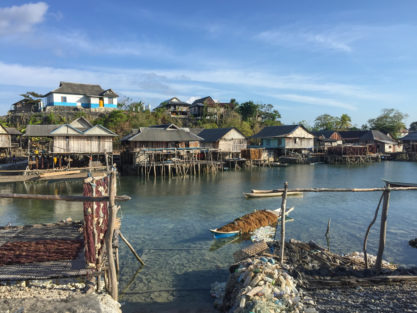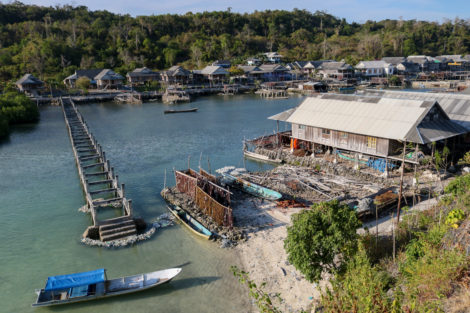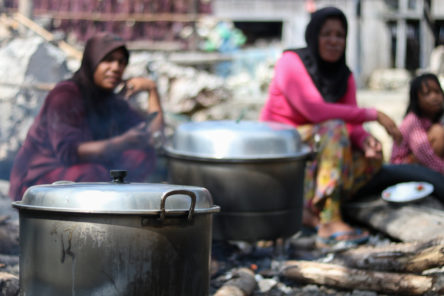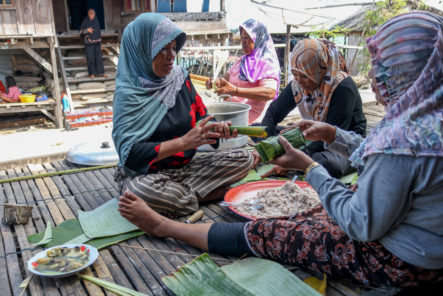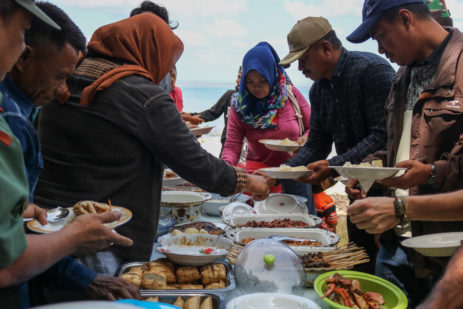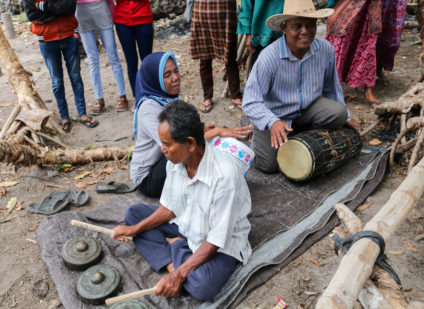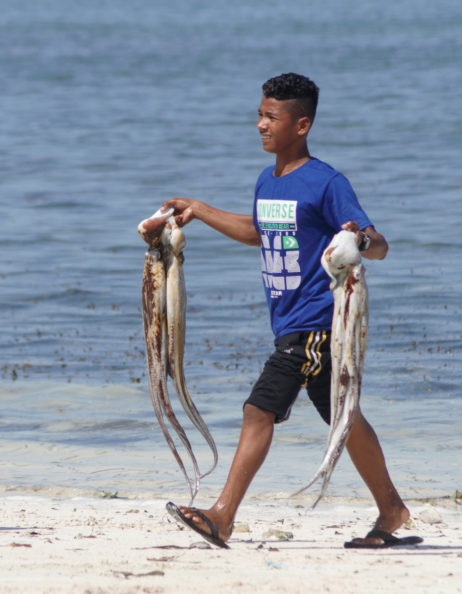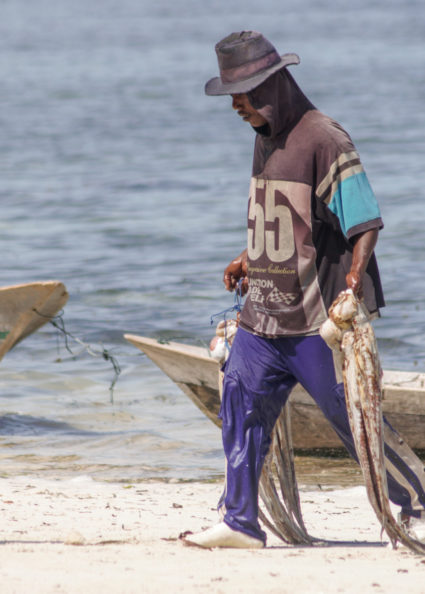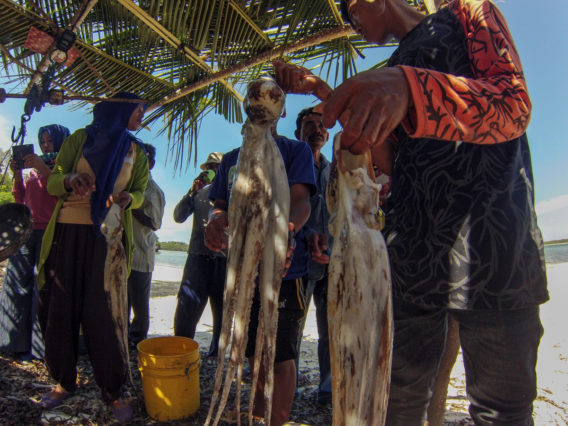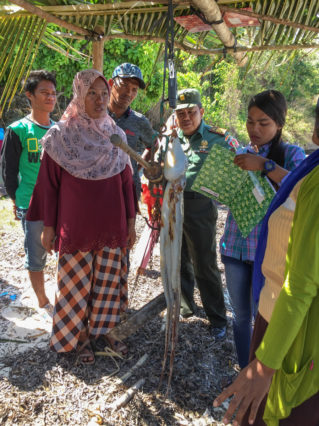By Indah Rufiati, Lugas Hakim, and Maman Cornsmith.
As I walked through Darawa village on the beautiful and sunny Sunday morning of 2 September, it was clear that the community was preparing to celebrate. I saw white steam billowing from four large cooking pots, stacked neatly over a never ending supply of firewood, and I could smell the intoxicating aromas of lapa-lapa [rice cakes wrapped in coconut leaves] and seafood stews made from the the most recent catch of crabs, squid, clams and snappers.
While the women were busily preparing this feast, young girls from the local schools were chatting enthusiastically as they finalised their colourful costumes for the traditional dance performance they were about to give. All these preparations were to celebrate the reopening of Fulua Nto’oge, a 50 hectare octopus fishing site off One Mbiha beach, which had been closed since 1 June.
Temporary fishery closures serve to give the octopus time to increase in size and reproduce. This management method is successful because the life cycle of octopus is short – they typically only live for 15-18 months – and they grow very quickly during the first 6 months, almost doubling in weight every month during this period. At the end of a temporary fishery closure, the octopus fishers should be rewarded with the financial benefits of catching more and larger octopus.
Forkani, Blue Ventures’ partner in Indonesia, has been supporting community in Darawa village, Wakatobi, to implement their octopus fishery closure. This has included facilitating many community meetings in order to reach a consensus about closure timing, location and regulations, and assisting outreach efforts in the four neighbouring villages to ensure that they understand and respect the Darawa community’s closure rules.
Every member of a community is responsible for the protection of their environment and the management of their resources, so it is vital that everyone works together. Only when you are confident in this can you truly show other communities in neighbouring villages that your regulations are worth respecting.” – La Beloro, Head of Forkani
Walking past all the exciting preparations for later, I continued through Darawa village down to One Mbiha beach where a ceremony was being held to officially reopen the fishing grounds. This ceremony began with traditional prayers and chants, led by the community elders, asking for God’s blessing on the opening. It a was very serene and beautiful occasion. Offerings such as cakes, red bananas, betel leaves, and eggs were given to God, to the ancestors, and to nature, at four points around the closure site. This was a touching reflection of the gratefulness of the Darawa community for the blessing of their marine resources.
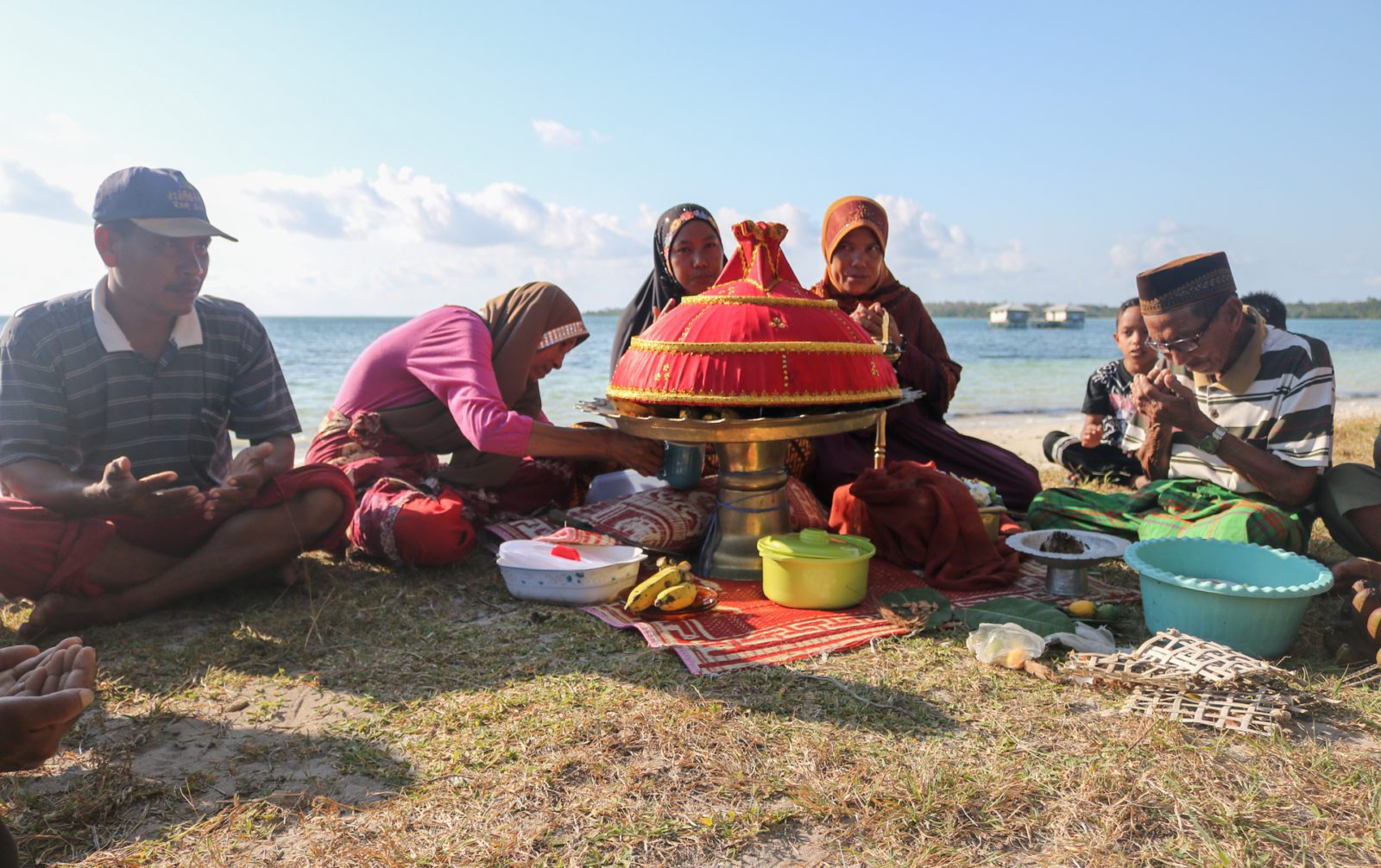
Prayers and offerings at the traditional ceremony | Photo: Sara Barata Kahedupa
After these offerings were made, several fishers, together with members of Forkani, began removing the flags spread across the site that have been used to mark the closure area. Once this was complete, Fulua Nto’oge was officially open for fishing!
While the fishers were out on the reef, I joined the rest of the Darawa community – and representatives from the local/regional government – gathering under a large bamboo tent on One Mbiha beach. Pak Jumani, the Head of Darawa Village, stood up to give an opening speech, and the crowd of people all went quiet to listen.
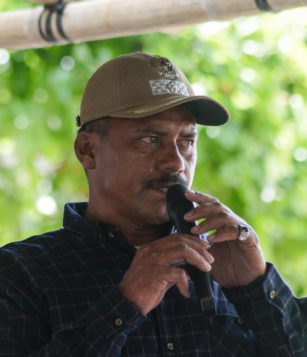
Pak Jumani’s speech | Photo: Indah Rufiati
“We are very proud of our achievement: implementing this temporary fishery closure in our village. This whole process has proved that the Darawa community can work together as a team when it comes to monitoring our fishing sites and managing our fisheries. We have also been successful with encouraging our neighbouring communities to follow our rules. We will continue implementing temporary fishery closures, and we will make it part of our village programme. That is because our hope lies in the sea.” – Pak Jumani, Head of Darawa Village.
That beautiful speech got a big round of applause from the crowd, and I saw a lot of proud and happy faces from the community, colouring the already beautiful day with even more joy.
Once the speeches were over, the sounds of gong, kendang and bonang (traditional music instrument) started echoing around the tent, the sign that traditional dances were about to be performed on the stage. The first dance was the Lariangi from Kaledupa Island, performed by ten dancers in magnificent traditional costumes. The next performances – the kenta-kenta and octopus dances – were performed by energic primary school girls, and told the story of octopus fishing in Darawa Village.
My spirits were soaring after watching these magnificent performances, and they rose further still as the food I’d seen being prepared earlier arrived at the tent in time for a communal lunch.
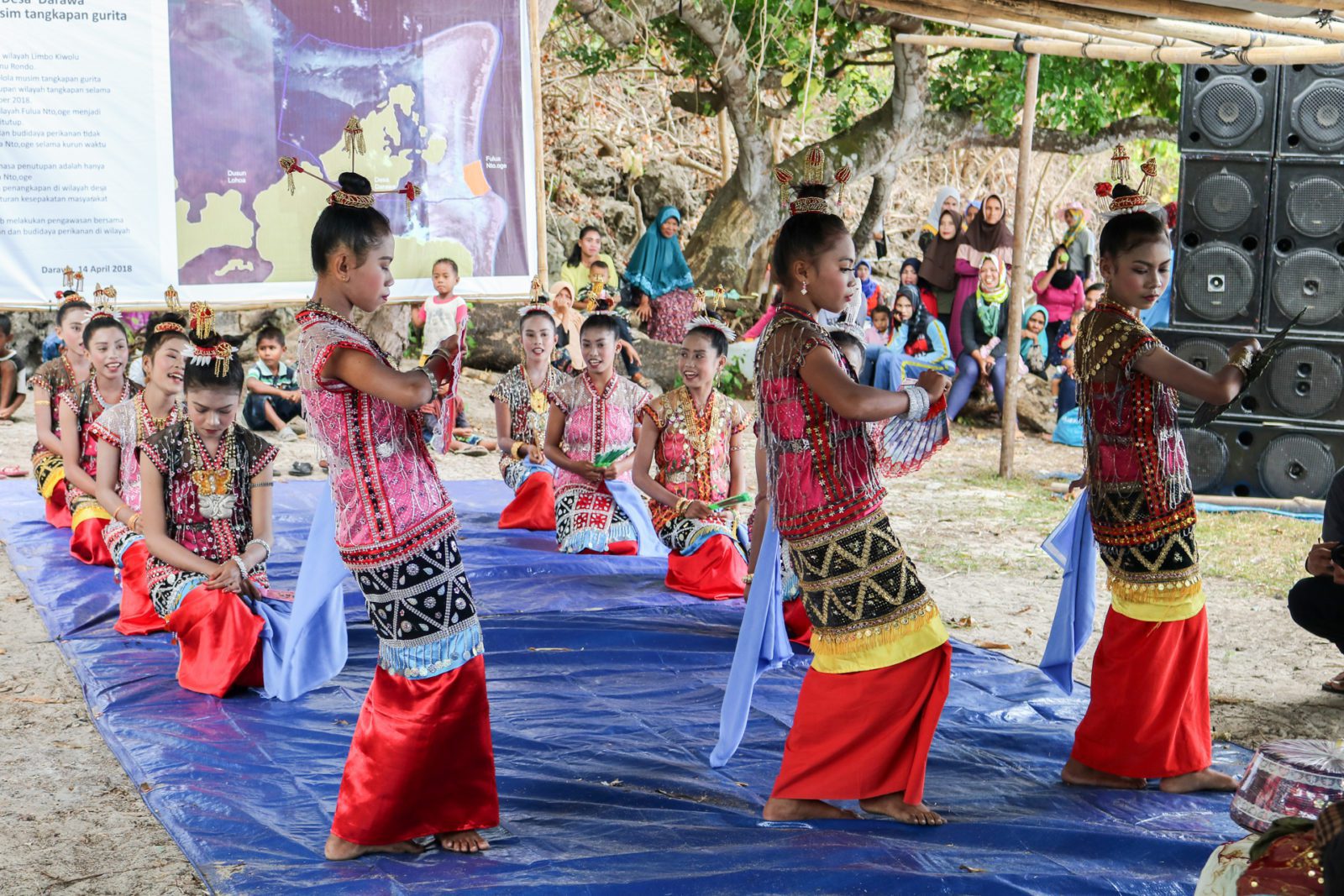
Larangi, the traditional dance of Kaledupa Island.
In the early afternoon, the boats of the returning fishers started to appear on the horizon. We all watched as they slowly approached, pulled their boats onto the white sands, and brought their catch to the data collectors waiting next to the tent.
The waiting crowd gathered around the designated monitoring spaces to see the results of the catch as more fishers arrived from the Fulua Nto’oge area. The atmosphere was one of excitement and curiosity, and everyone cheered each time one of the fishers pulled big octopuses from their boat.
One of the fishers had caught a huge squid caught at Fulua Nto’oge, as well as several octopuses, and he showed it to the fascinated crowd while the data collectors were busy weighing and measuring the rest of this catch.
This opening day was truly something to celebrate. The values of participation and collaboration were evident amongst the Darawa community regardless of gender, age, political opinion or social status. Everyone attended the ceremony to commemorate the hard work that had gone into making the closure a reality, celebrate the reopening of their temporary fishery closure, and show their support for fisheries management.
A few days later, more than 40 people gathered to attend a feedback session with Forkani to discuss the results of the closure and the next steps for furthering their octopus fishery management. There was lots of lively debate amongst the community, with fishermen and fisherwomen voicing their thoughts and feelings about the closure. While everybody was happy about the closure in general, the consensus was that women fishers had not benefited equally from this particular closure site as they tend to glean for octopus on foot rather than from boats, and the tides and topography of the Fulua Nto’oge closure site made this difficult.
Observing this meeting, it was clear to me that the underlying feeling was one of togetherness. People were listening to each other, there were lots of laughs and jokes amongst the discussion, and the final community decision was agreed upon without any discord. This decision was to have another closure from December 2018 to February 2019 in a fishing site called Uju Nu Umbu, while the closure in Fulua Nto’oge will be repeated again next year between June and August 2019.
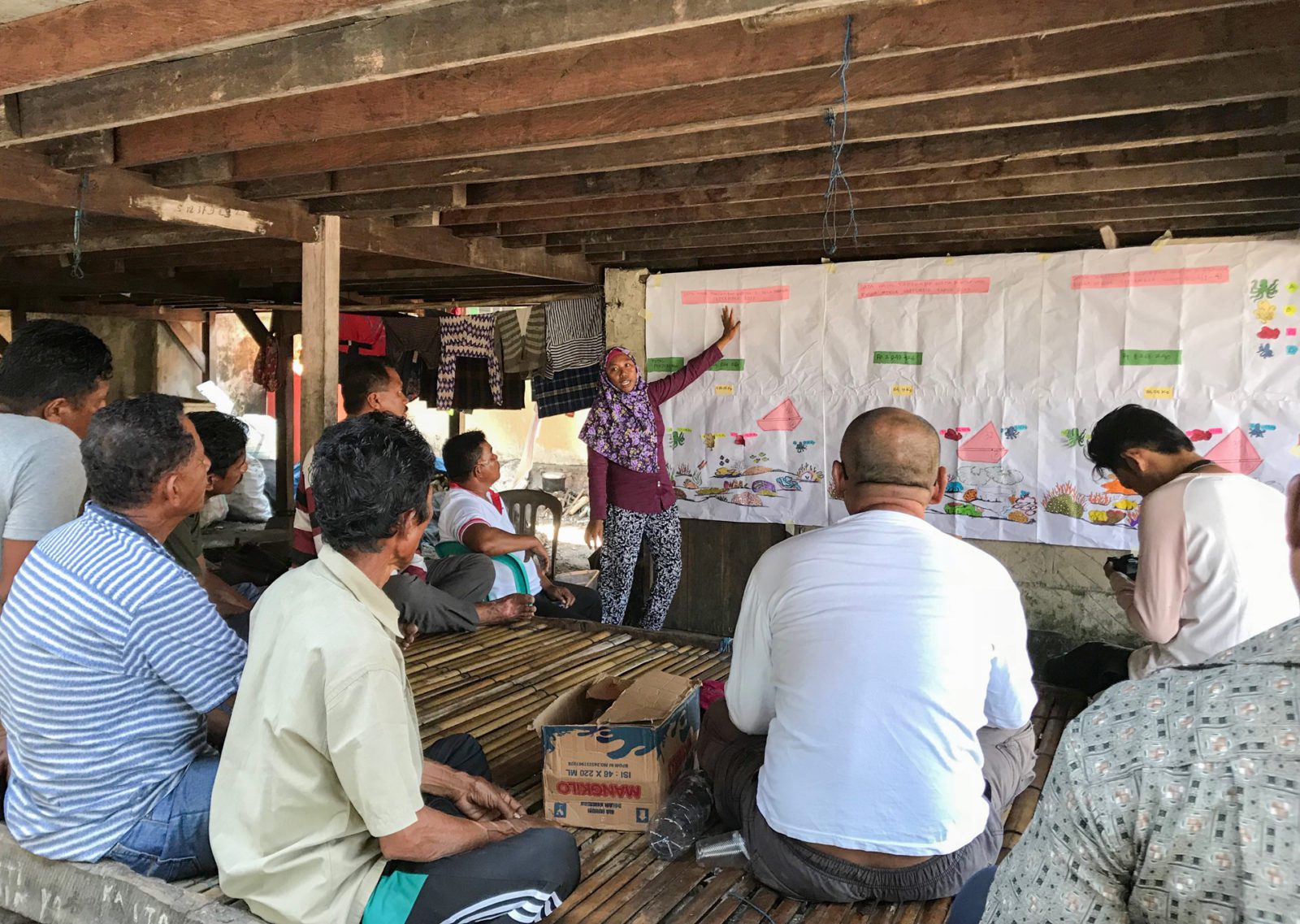
Forkani’s Nusi disseminates the closure data at the feedback session | Photo: Indah Rufiati
Witnessing the journey of the Darawa community has been a real privilege for me, and I’m eagerly awaiting what they will decide to do next. This first closure has led to stronger bonds of trust within the community, between the neighbouring communities, and with Forkani. These bonds have led to increased collaboration between all parties, and the establishment of robust monitoring systems, proving that the community has the capability for effective and sustainable management of their marine resources.
With a successful first closure under their belt and more on the way, the Darawa community is now preparing to adaptively manage their broader customary marine area – Limbo Kiwolu – which is one of nine customary marine areas on Kaledupa Island. Forkani is supporting the community with seeking formal recognition of Limbo Kiwolu, and developing a broader octopus fisheries management plan as part of a co-management agreement with the Wakatobi National Park Authorities.
Find out more about our work supporting partners


